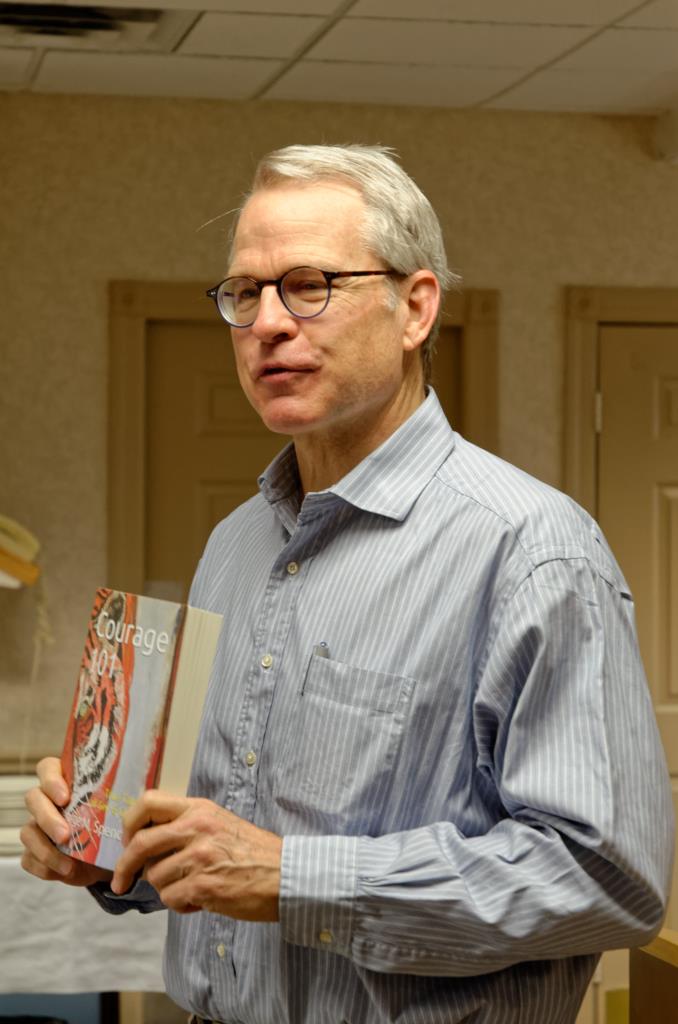President Michelle introduced our speaker, George Spencer, the executive editor of the Dartmouth Alumni Magazine. Michelle met George at our club’s booth at the Farmers Market two weeks ago, where he expressed interest in talking to our club about the new book he has authored, Courage 101: True Tales of Grit and Courage.

George began his talk with a definition of “courage”—a word from the French meaning “heart.” It indicates a person’s possession of a “stout heart,” enabling him/her to overcome fear, which is the flipside of courage. George especially likes the definition once given by John Wayne: “Courage is saddling up even if you’re afraid to do so.” The book consists of 101 short narratives about individuals who have shown remarkable courage in their lives.
John Wayne is one of those individuals. Wayne grew up in poverty, got a football scholarship to college but had to leave when he suffered a broken collarbone. He worked as a flunky around the set of a movie studio, where a director spied him and put him in a 1931 film that was a flop. Failed films followed his career throughout the Depression until 1939, when he appeared in “Stagecoach” and became a star.
Another person of courage to appear in George’s book is Brownie Wise, a woman from the American South who in 1950 was working as an assistant catering a birthday party when she knocked a food container off a table filled with glassware and noticed that it remarkably didn’t break. She asked her supervisor about the nature of the container, and he dismissed it as junk that wasn’t going to sold any more. Brownie investigated the origin of the product, found the inventor/manufacturer, and convinced him to take her on as a salesperson—using home gatherings of “housewives” to sell the containers. The inventor’s name was Earl Tupper, and the Tupperware Party was born—to earn both him and Brownie fame and fortune. By 1957 Brownie had 10,000 women working for her. Sandra Bullock is in the process of making a movie of her life.
A local hero who appears in Courage 101 got off to a rocky start when he was caught with a bottle of gin in his college dorm room and was barred from participating in extracurricular activities, which included drawing cartoons for the college newspaper. He slipped in a few unsigned cartoons but spent most of the 1930s drawing newspaper advertisements. In 1936 he tried to get his artwork and poetry published, but twenty-seven different publishers turned him down. After the last rejection he was walking miserably home to tear up his project when he ran into a college friend on the street. It so happened that the friend had just landed a job that morning with a publisher and took Theodor Seuss Geisel that same day to his new boss at the publishing house, which ended up publishing And to Think That I Saw It on Mulberry Street. That title has seen 600,000,000 copies in print.
The fourth person who George referenced in his talk to the club was Julianne Koepcke, a teenage girl from Peru who was traveling in a plane that blew up over the Amazon jungle. She landed intact in the jungle still strapped into her passenger seat. Shoeless and wearing only a white minidress, she followed a stream (advice once given to her by her father) while dodging piranhas and alligators to a lonely hut that was serendipitously noticed by a passing boat. Her explanation: “I didn’t give up.”
George’s further example of courage was the story of Harold Russell, who was a meat cutter in a grocery store before joining the Army and becoming an explosives instructor at Fort Benning. An accident blew off both his hands. He appeared in an Army training film exhibiting the use of the hooks that now served as his hands. The movie director William Wyler saw Harold in the Army film and cast him in the film Best Years of Our Lives with Fredric March and Dana Andrews. Harold won an Oscar for his roles in both films and ended up serving three terms as national commander of AMVETS.
George’s final example of courage was Viktor Frankl, an Austrian physician in the 1930s. Frankl had obtained permission to leave Austria (and thereby escape Hitler’s campaign to exterminate the Jews), but because his wife and parents were not able to leave Austria with him, he chose to stay. He and his family were sent to concentration camps. Only Frankl survived. While in the concentration camps, Frankl became fascinated with the question why some people lived and some people died (just gave up). The result of Frankl’s experiences was the book Man’s Search for Meaning, which has seen 20,000,000 copies in print. His message is that the purpose of life is the search for meaning.
George summed up his litany of courageous people with the thought that “nobody can take what’s between your ears away from you.” In taking on the chore of writing Courage 101, he told himself that he would write 101 stories in 100 days. The product of his labors can be obtained through Amazon, and you can find excepts from the book at this link: https://365courage.blogspot.com.